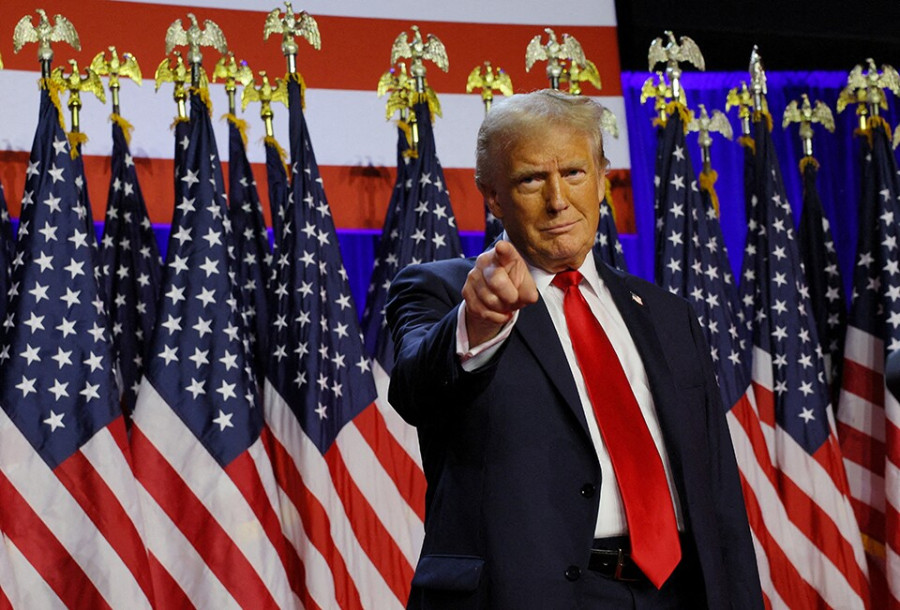Columns
God bless America
The world should brace for Trump’s second tenure, but more importantly, it should gradually unpack his victory.
Anurag Acharya
The American fate has been sealed. Donald Trump has been elected the 47th President of the United States. If his victory in 2016 was more than just a fluke, it is convincing and comprehensive this time. This is what the common Americans want, and the rest of the world will have to live with it, just like the supporters of his Demoractic rival, Kamala Harris, who are still in shock.
We can discuss what Trump’s re-election means for the rest of the world and this region, but let us first take a longer detour to understand what is brewing inside the world’s largest democracy.
American nightmare
In the first week of March 2024, The New York Times published a report based on their telephone survey of around 980 registered voters, where they interviewed each participant about their perception of the two US presidential candidates. The survey, conducted in collaboration with Siena College in New York, showed that Trump had the support of 44 percent of the prospective voters, compared to 38 percent who favoured then-Democratic candidate Joe Biden. The survey results were significant, considering Trump's exit in 2020 as one of the most disliked presidents in US history, with multiple criminal charges against him.
More significantly, only a quarter of the respondents thought the country was on the right track, and around 50 percent believed that the Biden administration’s policies had personally hurt them. A few weeks before the polls, the survey team returned to the seven states, known as the battleground states, to understand the voting behaviour of roughly 7879 likely voters. Close to 90 percent of the participants were certain they would vote, but interestingly, 62 percent were undecided or refused to discuss their voting preference.
The question then is, why were television channels and political pundits predicting Harris’s victory when the data and survey polls were far from conclusive? The answer is a bitter pill that analysts and panellists, engaged in an unenviable job of predicting elections, have difficulty swallowing. The world is unfair, and people usually make choices that benefit them personally. From our own electoral experiences, in a developing or developed country, in a highly progressive democracy or a flawed one, we have learned the hard way not to take the voters for granted. Common voters—unlike a party worker, an academic or a self-styled activist, can be individualists who think only about what the candidate has to offer and how their policies affect their lives. They are not always burdened by the higher morals of society, nor are they too concerned about events that don’t directly impact their lives. This is especially true if the voters believe their interests are being put at stake by their representatives in the name of a larger public good. This is at the heart of the majoritarian conservatism that is leading the world into a democratic back-sliding.
For millions of people of colour, including Asian Americans, who migrated to the US in the 80s and the 90s, the American dream from Hollywood movies became a reality when the US government adopted a diversity policy to fulfil its skilled manpower needs. There is every reason to believe this policy boosted the US economy and projected the country as the land of democracy and dreams for minorities. But what did it do to the mindset of the majority of white Americans, including the working middle-class population? We do not know, do we? The nationalist rhetoric, often spewing hate against immigrants of different colour and races, did not gain strong support among a large section in a day or a decade.
My own experience of writing and talking about the political inclusion of minorities has taught me spending too much time talking in an eco-chamber can blind-sight you from the reality unfolding right before your eyes. The sooner intellectuals and activists in the US understand this, the more they will be invested and interested in understanding the insecurities that have haunted their majority population. After all, the economic and environmental shocks the world has been facing since the last few decades have affected us all, irrespective of race, gender or ethnicity.
The global aftershocks
If Trump’s re-election has sent shockwaves within the US, its aftershocks will be felt across different continents. His final months of the campaign focused on convincing the Americans that the Biden-Harris administration was bleeding the US economy by fighting proxy wars and that he would get both Putin and Netanyahu to end the ongoing wars in Ukraine and the Middle East. It will take more than two months for Trump to assume office at the White House and another month for his administration to be in order. Any chances of direct talks with Russia and Israel, if at all, are a few months away.
In the Indo-Pacific region, Trump will most likely continue on the course set by the previous administration. Given the global economic crisis that has had far-reaching consequences for both the Chinese and the American economies, Beijing and Washington have agreed to a gradual de-escalation in the Indo-Pacific. Any radical departure from this course will hurt both superpowers and push the global economy into another meltdown. The de-escalation between the nuclear powers will also benefit smaller South Asian states caught in a difficult big-power rivalry.
A parallel development in this regard is the US’s relationship with India, which has been strained by the alleged involvement of Indian diplomats in espionage and attempted assassination on US soil. Similar allegations by Canada have resulted in a severe diplomatic fallout with New Delhi. It is unclear how the incoming Trump administration will react to these developments, especially when there is pre-existing discontent over New Delhi’s close ties with the Russians while continuing its security alliance with the US in the Indo-Pacific. If the recent Brazil, Russia, India, China, and South Africa (BRICS) summit in Russia is of any consequence, Washington will need more than just a fleeting interest in the region to fix things with New Delhi. But is Trump ready to ride the high tides in the Indo-Pacific just yet?
The president of the US is the world’s most powerful executive, commanding the largest economy and military. So, Trump's re-election as president is one of the most significant political developments of this decade. While Trump’s position concerning the climate crisis and human rights is deeply concerning, the global community will be more interested in his efforts to restore peace in war-ravaged Europe and the Middle East. On the domestic issues, however, we can only say: God bless America!




 8.54°C Kathmandu
8.54°C Kathmandu















